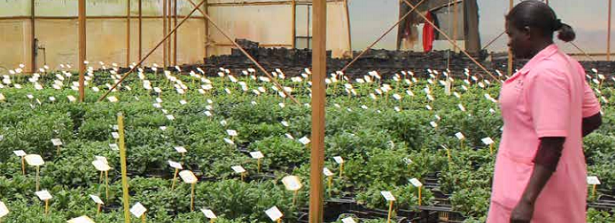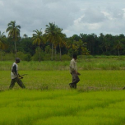Discussion meeting on food security effects of floriculture in East-Africa

On June 9, the Dutch Ministry of Foreign Affairs (MoFA) hosted a presentation about the scoping study, “Flowers for Food?” conducted by the Netherlands Academy on Land Governance (LANDac)/IDS Utrecht University and the Food & Business Knowledge Platform. Around 30 participants attended the presentation, mostly representatives from different government agencies, and a number of experts from academia, NGOs and certification bodies. The study evaluated the local impacts of Dutch floriculture investments as based on fieldwork from Kenya, Tanzania, Uganda and Ethiopia. In the report, the complex linkages between those investments, land governance and food security were analyzed. The discussion afterwards focused on living wages and if farming can be substituted by other non-food investments when wages are high enough to purchase quality food.
Download the report “Flowers for food?” here.
The lead researcher Evans Kirigia presented the study and Caroline Wildeman (Hivos) and Johan Veul (Ministry of Foreign Affairs) responded to the presentation and the key findings from the report. Kirigia’s presentation revealed that impacts of floriculture on land acquisition, water, local development and food security are complex within and across the studied countries. Some of the positive development impacts include employment opportunities as provided by floriculture, corporate social responsibility (CSR) projects, and infrastructure. However, the people employed are mostly migrant workers. While they have jobs, their wage is often below a living wage and due to their more expensive “urban lifestyle”, it has remained difficult to live a decent life and buy sufficient and nutritious food. The developed CSR initiatives tend to limit their focus on only employees of the farm.
According to the report, the negative impacts from the investments were: displacement from land; restricted access to water; untreated water discharge; exposure to chemicals; employment insecurity; and long working hours with negative effects on food security. The anticipated transfer of technological knowledge to farmers in order to improve their production seems to be largely absent due to the lack of compatibility between high-technology flower farms and local smallholder farmers, as well as the “enclavity” of the flower farms and high costs of technologies applied. In regards to food security, the reliance on local markets negatively impacts food security as there is an insufficient supply during the monsoon season and prices often go up when it’s payday at the flower firms. Low wages, buying on credit and the low diet variability also impact the food security negatively. Kirigia also presented an alternative business model where individual farmers would only use one-eighth of their plots to grow flowers and use the remaining land to produce food crops.
Download the PowerPoint presentation on the Flowers for Food report here.
Wildeman commented that she missed the gender-dimension in the presentation and that the reliance on hired migrant labour is disturbing since this creates additional livelihood vulnerabilities. The underlying assumption for investing in floriculture to ensure food security is that the former food production can be replaced with a stable income where enough food can be bought. However, the question is how stable is the income, and is nutrition taken into account as well? Her recommendations for the Dutch government were the following: to set up a sector covenant; exchange knowledge and experiences on the accomplishments in the garment industry; and encourage the embassies to promote a livable wage. She suggested that the recently developed sector-based CSR covenants could be an opportunity for further aligning Dutch investments in the floral sector in Africa. She also highlighted that Dutch consumers are willing to pay more for fair-trade flowers and that awareness is therefore important as well.
Johan Veul agreed that quality income is important, and that the Ministry works with governments in the respective countries to implement this. In addition, trade union programmes are set up to ensure that employers are able to express their demands better. However, quite a lot depends on the willingness of local governments. Regarding consumer awareness, Veul added that even though campaigns could raise awareness, consumer behaviour is not so easily changed. A covenant is set up in floriculture but MoFA does not have the capacity to do more and because of that, processes tend to move slowly. Concerning, alternative business models, Veul argued that the current large scale production system might be the only one that is working. Maybe small-holder/out-grower systems are not viable at a larger scale. This is a point of concern to be further explored with the private investors.
The discussion with the attendees focused on the importance of alternative business models, displacements caused by the establishment of flower farms and traceability of fair-trade flowers (Fair Flowers Fair Plants label, for example). In alternative business models, employees could have small plots to produce food-crops (an example of this and other CSR practices of Fynlays in Kenya is presented in this video, partly in Dutch). However, Kirigia mentioned that while this could ensure access to food, employees have limited time to attend their plots. In regards to displacement, he explained that relocated farmers experience negative impacts on their food security status considering their frequent moves to less productive lands where they also not have their social network. Veul mentioned that the report is only a snapshot and that it is important to understand how the food security situation was before and where we are heading now when evaluating investments. Some participants also argued for a broader than usual focus when looking at the flower sector, also taking into account developments such as easing the transition towards more urban areas with increasing food prices and greater dependencies on income generation. Linked to this, the role of education and literacy was highlighted as that making people aware of their rights is difficult when they are unable to read their own contracts.
Follow-up research has been started by Utrecht University in the context of the ‘Follow the food’ GCP research programme. In addition, the Shared-Value Foundation will start a dialogue between researchers and companies to ensure that these and other research findings will be linked to private sector interventions.







I have come to realize the importance of access to information and implementation on the same for the sake of development and solution to food security and agribusiness which can reduce poverty and provide food security
informed and agribusiness focused farmers are able to make the right decision in matters of farm management crop production and investment on the right tools and equipment
As an experienced reporter and follower of flower industry, i feel the problem is a combination of many social and market issues i.e;
1.Land demarcations- one can not practice good farming on a tiny piece of land and the harvest can’t be meaningful either.
2. Lack of seriousness, planning and market research in the agricultural sector (Uganda). This has left farmers in suspense, the people who are supposed to guide their transition from stone age farming practices to new, modern and profit oriented farming have been made redundant by the political leaderships that deliberately allocate village sized budgets to a sector that employs 80% of the population.
3. Beauracracy in the public sector that has made it impossible for the private sector to positively contribute in nation building. How can modern farming technologies be transferred to the farmers without the public sector?
4. Effects of climate change have complicated issues for the already illiterate and poor farmers. The seasons that they used to rely on to prepare, plant and harvest crops have disappeared without trace.
5. Poor quality seeds and the farmers inability to afford high yield seeds.
6.Lack of land governance laws and infrastructure means that the invest usually picks the bills meant for government which leaves him/her with little or nothing to invest in the communities around the farms.
7. The lack of interest and unwillingness of the younger generation to participate in farming. They think it’s time consuming and pays poorly. They often run where they can get quick money.
8. The devastating effects of the AIDS pandemic also played a big role in placing the agricultural sector into the hands of the elderly and children.
9. Increased urban migration- most able bodied youth have moved to cities to ride boda bodas, become street vendors, mobile phones airtime sellers or mobile mani/ pedicurists.
10. Increasing changes in social life patterns and attitudes also contribute to food insecurity.
The flower industry would not have gotten cheap labour if the above mentioned problems were dealt with. Farmers would be busy on their farms not just growing food but making money.